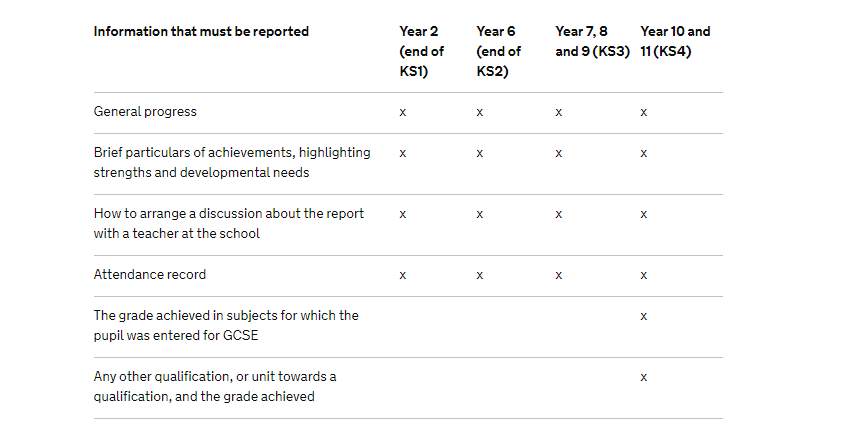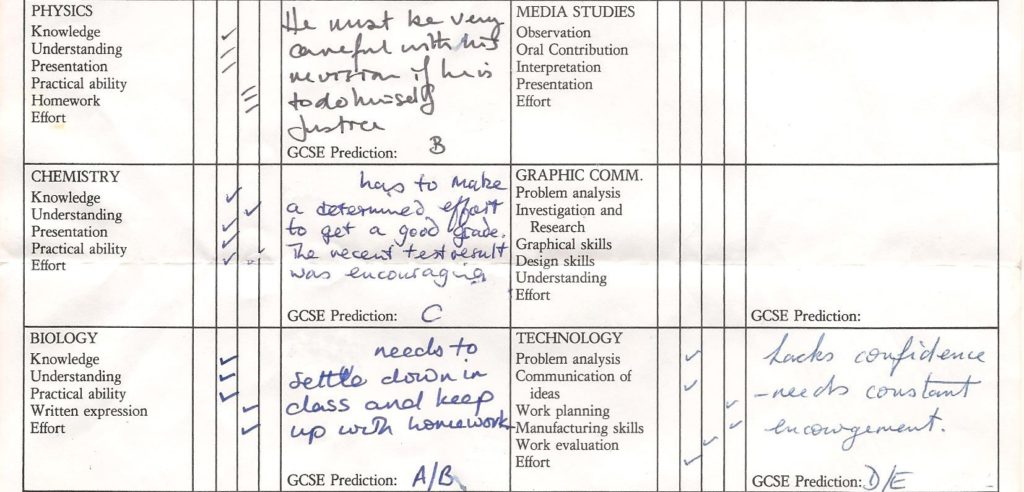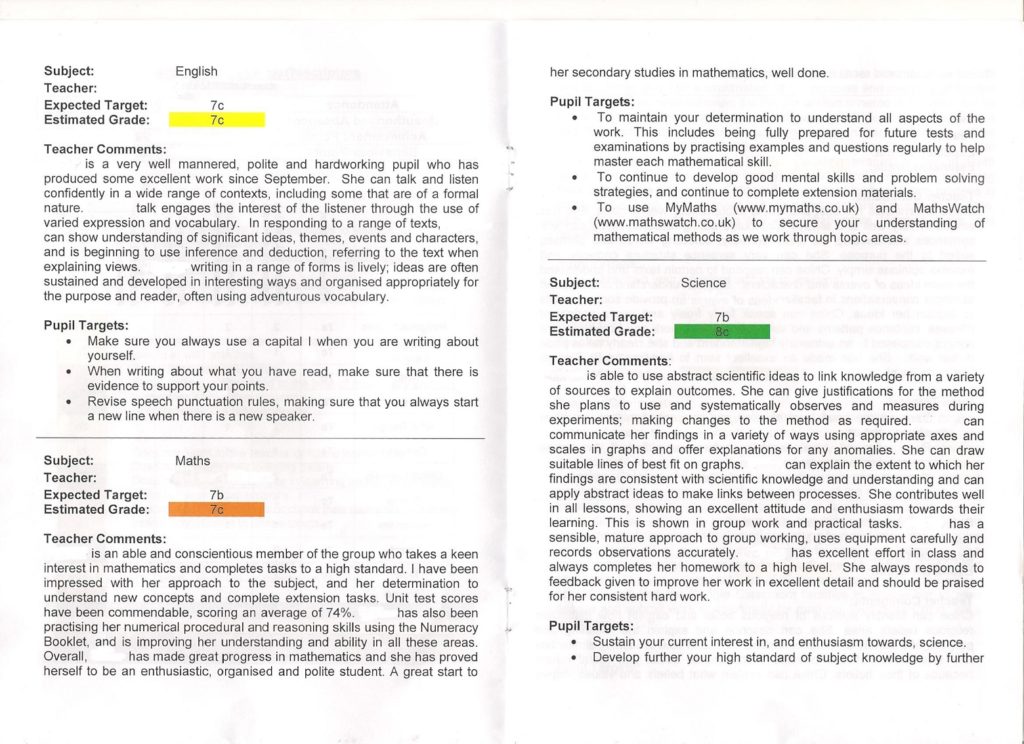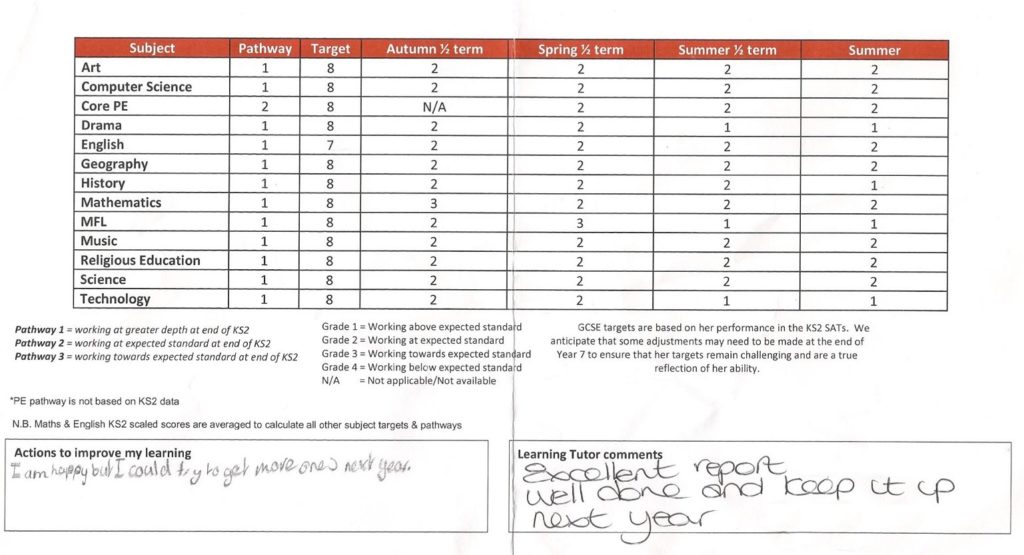Are school reports still fit for purpose? In my opinion the simple answer is no, not anymore. They are a requirement for schools to satisfy the overlord OFSTED but as time has progressed they offer less and less information and certainly lack meaningful information that parents can confidently act upon. The first problem is that these days, they are mainly software based, so teachers are restricted in the information they can actually provide by whichever program they are forced to use. The second problem is schools all do something different for KS3 (Years 7 – 9) since the levels were abandoned a few years ago. If you’ve ever read your child’s report and thought “what does that tell me?” or “what am I supposed to do with that?” then read on….
School reports should contain...
School reports, like most things, have evolved over the years. Some aspects of report writing have survived the year. Most notably, a form of tick list grading system from ‘very good’ through to ‘poor’ for aspects such as homework, effort, etc. There is also, hopefully, a grade indicating achievement level given to inform parents what their kids should achieve. The following table outlines the Government requirements on the information schools must report to parents once an academic year.

So they have to tell you if your child is making progress or not, we shall return to this later! Highlighting areas of strength or need are covered by the tick boxes referred to above. Ways for parents to respond or raise their concerns should be indicated but they are often sent out in close proximity to the parents’ evening, a strategy discussed further in our parents’ evening post linked below. Attendance record is there just in case your child has been living a secret life instead of going to school but these days most parents are passionately diligent in regards to knowing where their little angels are when they are out of sight. Finally, they report a grade achieved, but are only required to do this from year 10 and again we shall return to this point in more detail later as it is crucial.
Reporting in the olden days!
Somewhat disconcertingly, my kids refer to the 80s as ‘the olden days!’. If like me you grew up in the era of ridiculous perms, painfully tight jeans with odd pair of fluorescent socks then your school report may have looked something like this……

I’m so ancient that I can proudly claim to be a GCSE guinea pig as O Levels were consigned to dusty store cupboard the previous year. Sadly, I haven’t added a sepia effect here but as you can see from my report above it gave a predicted grade for each subject. However, no indication or explanation of how this prediction was arrived at is given. Was it based on my effort and knowledge at the time? Or maybe it was my teachers using their experience and judgement to factor in things like my late revision push and my concerted effort at the business end of the year to estimate the grade they thought I’d achieve. I genuinely don’t know the answer to this but only two of my nine grades were predicted correctly.
My parents did exactly what you’d expect of them at this time. A mixture of nagging when they thought I wasn’t doing enough work, encouraging me and raising my self-belief and aspirations. However, based on the report above, what help could they really give?
“He must be very careful with his revision if he is to do himself justice”
My parents weren’t teachers. They did not have any experience or knowledge (other than their own black and white memories from 30 years earlier) of what effective revision looks like. They also had to rely on the word of a laid-back 16-year-old boy who would say what was needed to avoid further nagging. In truth, I did very little revision until the last few weeks but fortunately had the intelligence and memory to enable me to achieve good grades and continue to the 6th form. The above quote, while well-intended did nothing to help my parents help me at all. It is a common, non-specific line rolled out many times a year to this day is of very little use at all. It is teacher-speak for “I suspect the lad is doing very little work and he needs to pull his finger out and take these exams seriously!” They were also hampered by the fact that in those days there were no targets, nothing official to indicate to them to what they should expect me to achieve.
The teachers they are a-changin'
Come gather 'round people, wherever you roam
And admit that the teachers around you have grown
Teaching changed significantly with the introduction of target grades and teacher performance being measured by how their pupils achieve in relation to these target grades. My teachers were in the position where if they perceived I wasn’t doing enough to pass, that was down to me and there were limited consequences to them if I went on to fail. Consider that at that time a lot of teaching consisted of trying to copy notes as quickly as you could from an ever-rotating blackboard or seemingly endless dictation, and you start to form a picture. I’m sure some of you are shuddering at similar memories and your heads are filled with many other bad examples of your own personal learning experience. I am generalising about my worst memories from school and I must be clear that even though I had bad teachers I also had exceptional ones too. Individuals who gave their time, care and total devotion to giving me every opportunity to succeed and overcome personal difficulties during adolescence. Indeed, individuals whose influence on me was so profound I eventually became a teacher to try and emulate them and based my teaching technique on my memories of their dedication and relationship with me.
Teaching has moved on significantly since the 1980’s! Dictation, copying notes, etc are thankfully regarded as very poor practice these days and teachers now use a vast array of techniques and share good practice, techniques and resources as a matter of course. Furthermore, teachers now have performance management targets which are measurable so all teachers are driven to help their pupils achieve the highest grades possible. Clearly the vast majority strive for this anyway or they wouldn’t have become teachers in the first place. Before an angry mob carrying flaming torches and pitchforks head for my door, I am all too aware there are problems and negatives associated with measuring performance too. However, this is not the forum or time to get into that as my aim is to help parents and not start a debate on the pros and cons of measuring teacher performance.
It is important though to realise that this is one example of the many factors that now detract from the actual teaching aspect of the job. Like most professions these days, teachers are bogged down in form-filling, box-ticking and other arguably time-wasting tasks that hinder their ability to do the job as they wish they could. This brings us nicely back to the task of report writing.
Changes in reports over the years...
When I became a teacher in the 90s I would hand write a paragraph for each pupil on one occasion during the school year to go home as part of the annual report. I put a lot of effort into this as it was my opportunity to say what I felt about that pupil and a brief window to make a difference to the outcomes that child would achieve. I particularly enjoyed writing a rewarding passage of praise for those pupils who just did everything you expected of them and more. It was also an opportunity to outline what the pupil needed to do to succeed in my subject. I would write a currently working at grade and tick boxes too. Over the following years, this changed to typing my comments on Word and endless battles with shifting margins and boxes as I battled to format documents on a screen. This made correcting mistakes and reprinting reports far quicker than using Tipp-ex and photocopying, all efforts to reduce the time spent by the teachers on writing the reports. This is the heart of the matter and why I feel school reports are no longer fit for purpose. Well, they serve the purpose of fulfilling a government requirement but are of little or no help to a parent wishing to help and contribute to their child’s education.
Report writing by hand or on a computer screen was an incredibly time-consuming task for the teacher let alone all the following admin, collating, etc that accompanied it. Enter….. the software!
The problem with report writing software
In order to increase efficiency and reduce the hours spent on reports, schools have increasingly adopted various forms of report writing software over the last decade. Copyright and legalities prevent me from posting examples in here, but a quick Google or YouTube search will give you ample examples. These are the main cause of reports no longer being fit for purpose in my opinion. They do a good job in terms of freeing up time within a school and doing all the admin on a hard drive, but they remove the personal aspect of a report. To clarify this, it is important you understand how they work. Below is an example of a Year 7 report from this year.

On the surface, it looks informative and has a written passage regarding how the pupil is progressing and working in each subject. However, the statements that make up each paragraph are pre-defined and selected from a drop-down menu. To give this context, when wanting to comment on the science homework of a pupil the science teacher will select an appropriate statement from a drop-down menu for that child. I’ve been there…for the best pupil in the class, select the top statement… for the laziest or naughtiest, select the bottom statement. The only other options are the statements in between. It’s a simplistic summary but it’s not far off the mark. You just can’t find a statement that says exactly what you want to say.
Now imagine trying to put together a paragraph describing your child’s performance over the last year at keeping their room tidy for example. You would have to describe their room from a list ranging from ‘their bedroom is so consistently spotless I could eat my dinner off the surfaces’ to ‘I think I saw a rat in my kid’s bedroom yesterday!’ and a range of increasingly negative statements in between. You could do it but it wouldn’t be an accurate reflection of your child! There are just too many variables and things you would want to change but couldn’t. It would be quicker than hand-writing your own thoughts, but would undoubtedly make rather different reading.
If you haven’t read our post called Exam Results Day: How To Avoid Disaster With Classmate (link at the bottom), please do. The reason is that this is how my friend’s daughter ended up with a consistent theme throughout her reports, saying she was making good progress when the opposite was true. She was a great kid who always worked hard so her teachers selected statements from the upper end of the drop-down list. These correctly praised her but gave an incorrect impression of how she was progressing in terms of grades. This is why reports no longer fit their purpose! On the plus side, at least these schools try to supply more information to parents. My own daughter’s report shows only numbers with her own comment but nothing from her subject teachers.

Finally, to compound the agony for us parents…..
In 2015 the coalition government abandoned using levels for KS3 and the national curriculum. If you’re interested you can read why here:
There are many reasons outlined in the document and my opinion on whether this is a good or bad thing is irrelevant. However, I do think that the following excerpt is important:
The education system lost sight of the need for a genuine conversation between parents and schools: to help parents support their children on this part of reading, or that part of maths; not focus on a blanket judgment that ‘your child is level 3, and that’s fine for a child of their age.’
Well, one of the consequences of moving away from levels is an increased ambiguity in “the conversation between parents and schools”. Unlike ten years ago, schools are now free to set their own targets for pupils and use a variety of methods to do this. Parents are generally clueless as to how these targets are arrived at. Indeed, I spoke to a friend who is a teacher in the Midlands this morning who described how her school use a ‘magic formula’ involving SATs, CATs (Cognitive Ability Tests) and national averages to produce theirs. She also commented on how the targets are much higher now that the school has been taken over by a trust. Another friend, a teacher in the North said his school have their targets set at county level then adjusted by the school leadership, so methods vary. Add to this the fact that schools now vary the way they indicate (if at all) if a pupil is on track to reach this target and it’s no wonder there is confusion among parents on what these reports are actually telling them.
More importantly, this creates confusion and frustration in regard to how to respond to the information in a useful and effective way in order to help their children improve and succeed. This is why Classmate was created, to use our expertise, experience and time (that teachers don’t have) to monitor reports, feedback and help you guide your children to achieve consistent progress and success. Please feel free to contact us with any questions or click the link below to join us.
Finally, I am all too aware of what emotive topics education and teaching are. I feel it is essential to state that I am not criticising teachers, I used to be one and they will always have my respect and admiration. I also sympathise with them due to the discrepancy between the work they want to do and the work they are enabled to do due to modern day demands, bureaucracy and box-ticking just like many other professions.
The Classmate Team
Share:
Everything you need to help your child succeed
Check out our options and choose the subscription that suits you



